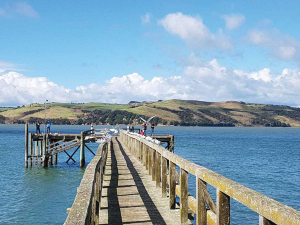Urgent action needed to restore Waikato lakes' health
Waikato is home to a diverse range of lakes, and experts say they urgently need better management and restoration.
 The Northland Regional Council says landowners and community groups are already working to improve the environment, but resourcing has been a constant struggle.
The Northland Regional Council says landowners and community groups are already working to improve the environment, but resourcing has been a constant struggle.
A $300 million project has been signed to try and prevent sediment loss from land to sea at Kaipara Harbour.
The Memorandum of Understanding (MOU) between the government, councils and Kaipara residents recognises an equal partnership between iwi and councils to undertake the Kaipara Moana Remediation Programme.
The programme is predicted to create around 300 new jobs; 200 for direct farm work such as fencing streams and wetlands, establishing water reticulation systems, preparing and planting land, weeding, and hill country stabilisation, and another 100 in the rural sector for nurseries, fencing manufacture, and farm advisory services.
Minister for the Environment David Parker signed the agreement with stakeholders this month.
Joint governance committee chair Tame Te Rangi says the committee will oversee a yet-to-be established entity charged with delivery of the 10-year Kaipara Moana Remediation Programme.
“One of our first priorities will be deciding the spend for the programme’s first year.
“We know there are many strands of the programme that are ready to go now, and these are what we’ll concentrate on first.
“We’re effectively carving out new history – this type of programme has never been done before – so it’s important we get the right logistics and processes in place and balance that with urgent action to give the harbour the help it needs.”
Auckland Mayor Phil Goff describes the agreement as a turning point for the restoration of the Kaipara Harbour.
“It represents all parties coming together to address the siltation and degradation of the Kaipara and the biggest-ever commitment of funds to remediate that damage,” he says.
“It’s a shared commitment to stop the erosion of the land which is devastating New Zealand’s largest harbour, and to begin to restore and preserve the harbour as a major fish-spawning and recreational asset,” Goff says.
Northland Regional Council Chair (and deputy chair of the joint committee) Penny Smart says it is important to recognise that landowners and community groups are already working to improve the environment, but resourcing has been a constant struggle.
The new government funding of $100 million for the first six years will help bring us together and enable large-scale and targeted progress to be made, Smart says.
The Government is set to announce two new acts to replace the contentious Resource Management Act (RMA) with the Prime Minister hinting that consents required by farmers could reduce by 46%.
Prime Minister Christopher Luxon says withdrawing from the Paris Agreement on climate change would be “a really dumb move”.
The University of Waikato has broken ground on its new medical school building.
Undoubtedly the doyen of rural culture, always with a wry smile, our favourite ginger ninja, Te Radar, in conjunction with his wife Ruth Spencer, has recently released an enchanting, yet educational read centred around rural New Zealand in one hundred objects.
Farmers are being urged to keep on top of measures to control Cysticerus ovis - or sheep measles - following a spike in infection rates.
The avocado industry is facing an extremely challenging season with all parts of the supply chain, especially growers, being warned to prepare for any eventuality.